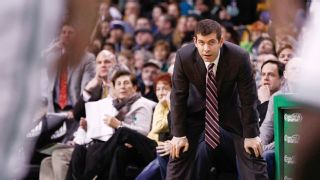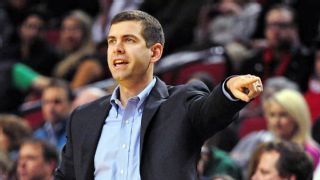|
The Celtics are entrenched in a spunky, tenacious playoff hunt, yet their coach behaves the same as he did when they were wobbling toward a 13-26 record, squandering 15 of the 20 leads they had amassed in the fourth quarter and mired in a fog of underwhelming results. As Boston morphs into a lovable band of overachievers and potential postseason menaces, their architect, the deadpan Brad Stevens, refuses to overreact, whether it's when his team disappoints with a lackluster performance through three quarters of a huge game against Miami on Wednesday (an effort Jae Crowder deemed "sickening"), or, in that same game, when the Celtics mount a furious fourth-quarter comeback that comes up just short. "When you watch Brad on the sidelines you can't tell whether his team is up 20 or down 20,'' observed Pistons coach Stan Van Gundy. "That's valuable for any team, but I think especially [with young guys], they see the calmness. If he doesn't panic, they won't panic.'' Stevens' quiescent demeanor amid the wildly fluctuating emotions of a young roster with a dizzying array of moving parts was a significant reason Danny Ainge targeted him as Doc Rivers' successor.  "Whenever we talked about college coaches as possible candidates for the Celtics, Danny always had Brad at the top of the list,'' said Suns general manager (and former Boston assistant GM) Ryan McDonough. "Danny felt Brad had the perfect demeanor for the NBA.'' Stevens knew he would have to absorb a carousel of roster moves and prolonged stretches of unsuccessful basketball. Yet understanding that in theory and actually experiencing it daily has been grueling. Asked how much he fretted about his coach's morale this season, Ainge replied, "Oh, it was maybe my No. 1 concern. I just tried to talk him through it best I could, knowing it wasn't going to be easy. One thing is for sure: Brad is our future -- and our present.'' As the Celtics flirt with a postseason berth in the anemic Eastern Conference (they're currently tied for the eighth spot), Stevens is being lauded for his sideline poise, his command of X's and O's, his late-game creativity (an alley-oop inbounds play to Marcus Smart in the final seconds?) and his ability to squeeze results out of a limited roster. "He's got them playing the right way and playing together,'' noted Spurs coach Gregg Popovich. "Neither of which are easy to accomplish.'' Stevens' small-ball lineups have resonated with Golden State coach Steve Kerr, who praised Boston as "one of the fastest, quickest teams in the NBA," and Van Gundy, who applauded Stevens' use of an unorthodox group of bigs who can shoot and drive and spread the floor. "When he's got you spread out on the perimeter like that, he makes the big guys on the other team very, very uncomfortable,'' Van Gundy said. "And the way he mixes his defenses to keep teams off balance ... in a very short amount of time -- less than two years -- Brad has proven that he's as good as anybody in this league.'' Stevens has juggled a roster that has included 40 different bodies (some who never played for the team) and endured 11 trades. Ainge dealt away his two best players (Rajon Rondo and Jeff Green) and handed the reins to a 20-year old rookie (Marcus Smart) who was shooting under 40 percent from the field at the time. Jared Sullinger, arguably the team's third best talent, has been shut down for the season with a foot injury. Veteran Tayshaun Prince, acquired in the Green trade, instantly became a Stevens favorite and the coach fought to retain him because of his basketball acumen. Ainge listened, sympathized, then moved Prince along for Jonas Jerebko and Luigi Datome. "The hardest part has been playing with a group that was constantly changing over a 15- or 18-month period and maintaining a sense of togetherness and optimism,'' Stevens conceded. While he quickly immersed himself in the NBA game, Stevens simultaneously had to wean himself from the college culture and his ties to Butler. That proved to be more difficult than anticipated. While Stevens was on a recent road trip with the Celtics, his family was at the NCAA tournament, cheering on their beloved Bulldogs. There were fleeting moments, Stevens admitted, when he questioned why he took this on, but those doubts have not persisted. "I talked with a friend halfway through the season when I was struggling,'' Stevens said. "He told me, 'I've got news for you. You probably haven't hit bottom yet.' "He was right. It was going to take time, but who knew how long? It takes time to build trust. "I've thought back on that conversation a lot. We had a meeting recently and guys were completely in on getting better off film, on figuring out, 'How can we be the best we can be?' So we're getting there.'' Stevens insists (correctly) the team is a long way from where it needs to be. Elite teams have exposed his team's weaknesses -- including excruciatingly limited options when it comes to closing out games on the offensive end. The defense also needs to be tighter and the players need to be more consistent. But the difference between November and now is they are in lock step with their coach. Stevens came to Boston with impeccable credentials, but veterans like Rondo, Green and Gerald Wallace wanted to see for themselves. That created an underlying sentiment of "show me.'' "I'm sure that was the case,'' Stevens said. "Likewise, when players come to our team, I don't want to assume anything about them. I don't want to hear what they have done or what they haven't done.''  Stevens' short tenure with Rondo was fascinating. They spent a chunk of the preseason in the gym together with Stevens offering tips on how Rondo could hone his unreliable jumper. They pored over analytics and plotted strategies on how to maximize the skills of the roster. Yet the coach couldn't retain the focus of the point guard, who was pondering his immediate future while playing for a team that was projected to be in the lottery. Rondo wanted to and needed to go (as evidenced by his startling post-trade revelation that he really hadn't played much defense in the last two seasons), and his final days in Boston were counterproductive. "He started off really well,'' Stevens said, "but then we had that stretch where we had those leads and lost them, and all those games affected him a little bit. "When he left, we lost the next four games, and I was thinking, 'uh oh.' Marcus was coming off an injury and Isaiah wasn't there yet. "An 82-game season requires a lot of resilience. We had stretches where we were beaten down, especially coming off last year, and the players had every reason not to be resilient. "But they have been. And they deserve a lot of credit for that.'' The trade for Isaiah Thomas provided Boston with a scorer who could utilize the high screen and break down defenses with his range and penetration capabilities. Crowder and Jerebko benefitted immediately from the open looks Thomas provided them when he drew a crowd in the paint and kicked it back out. Both Avery Bradley and Smart thrive off the ball, while Thomas needs and wants the ball to be in his hands, so it works -- for now, anyway. He is an exciting player who is the top Celtic in player efficiency rating (40th overall). Yet Thomas should not be tabbed as a savior. He's more like a double shot of espresso: He provides a badly needed jolt that pays instant dividends, but eventually the buzz wears off and you need additional sustenance. Before Wednesday, Thomas was ranked 18th overall among point guards in real plus minus. Only five players had higher offensive plus minus (plus-3.95) totals than him: Russell Westbrook, Stephen Curry, Chris Paul, Damon Lillard and Kyrie Irving. The flip side was that among top-40 point guards (Rondo, incidentally, was ranked 46th), none had a defensive real plus minus as low as Thomas (minus-2.64). His defensive deficiencies stem from his diminutive frame and the ability of opponents to shoot over him. Thomas is also a liability as a rebounder. That may explain why he's been with three teams in three years. His desire to be a starter was also an issue in his final days in Phoenix and could prove to be a thorny issue going forward with the Celtics if he has the same expectations. Thomas said when he came to Boston he felt he had something to prove. He should have taken a number. Tyler Zeller, Jerebko, Dotome, and Crowder have also been waiting for the chance to demonstrate they can be major contributors, not just bit players. "It's a chip-on-their-shoulder group, and I like that,'' Stevens said. "There's very little selfishness among them.'' Regardless of whether the team makes the playoffs, the coach has a stack of work ahead of him. He needs to convince Kelly Olynyk that when he shoots the ball he has to believe it's going in, not hope it's going in. He's got to whip Sullinger into shape. He needs to corral one of Smart's biggest assets -- his edge -- and make sure it doesn't turn into a embarrassing weakness, as it did in his assault on Matt Bonner last week. Stevens rightly condemned the act and challenged his rookie to learn and grow from his mistakes. Stevens is trying to do the same. It's too early to say where these Boston Celtics are headed, but it's pretty clear whose leading them -- the deadpan coach who shows nothing, but feels everything.
|

